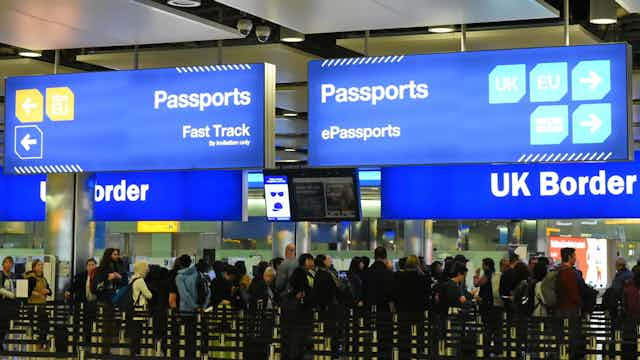The British government’s target to bring net migration down to the tens of thousands has been criticised in a new report by MPs, who claim it lumps all forms of migration together and has polarised opinion rather than responding to pre-existing concerns. Net migration – the difference between the number of people coming to the UK and those leaving – stood at 230,000 in the 12 months to June 2017.
The report, by the Home Affairs Committee, presents the findings of two recent inquiries prompted by the vote for the UK to leave the European Union. The success of the Leave vote has been widely attributed to opposition to the free movement of people within the EU, and to immigration more broadly.
The inquiries aimed to develop a consensus on Britain’s future immigration policy, and included written and oral submissions, opinion polls, online surveys, formal hearings, and informal community meetings. The organisations British Future and Hope Not Hate also organised 60 “citizen panels” as part of a national conversation on immigration.
The results suggest that the general public are both less polarised and more open to new information and rational argument about migration than was previously thought.
The government claims that increased immigration surveillance and enforcement, the now-infamous “hostile environment” for newcomers, and a target for total net migration, are driven by public concerns. But the report questions this, with MPs suggesting a more appropriate response to public concerns would be to increase resources for public services and provide the public with better information about the realities of migration.
When asked about immigration in the abstract, opinion surveys suggest that a majority of the British population want numbers reduced. But the findings from the citizen panels suggest that when people are given more concrete information, such as the reasons people move and the kind of jobs they do, many more are happy for migration to continue.

The committee’s inquiries identified widespread public support for refugees, who have been subject to severe restrictions even though they are excluded from the net migration target. The MPs found that many people who have concerns about refugee settlement are influenced by media reports or a lack of accurate information. For example, they might think that asylum seekers are dependent on welfare without understanding that most are not allowed to work and so are forced to rely on welfare and charities.
The report suggests many people support migration on the condition that migrants “contribute”, but this seems narrowly defined, excluding volunteering and other unpaid activity.
A time of insecurity
The MPs identify stories of successful integration, as well as division. They argue that:
Tension between resident communities and migrant populations appear most evident in those areas where new arrivals struggle to integrate, are temporary or lack certainty about their future.
The position of migrants is often made more temporary and uncertain by restrictions on their rights – and improving these rights could actually help reduce hostility. Learning English is important for integration, and there is good evidence that people want to learn. Yet the report notes that English classes are massively oversubscribed and their public funding has more than halved in seven years. Its authors make the case for increased funding for English language lessons.
High levels of public concern over migration were noted in places where new arrivals have coincided with inadequate resources for local services. The report suggests that if services were provided at an adequate level, this would do a lot to undermine public hostility to migrants. Struggling for resources to meet the needs of everyone in a local community can also unite people.
Public support for stronger immigration controls cannot be separated from the more general sense of a loss of control caused by economic insecurity, which is increasingly widespread. A combination of low-waged, insecure work, public sector cuts, welfare conditionality, and the rising cost of living have left large sections of the population struggling to access the resources they need. Some groups and places have been particularly severely affected. How people respond to a sense of insecurity is a political question, which is influenced by the way public conversations are framed.
Beyond national boundaries
National divisions and country borders are often framed as “natural”, when in fact they are relatively recent interventions that carve up the world and structure societies. Rather than benign facts of life, borders reflect and reinforce inequalities of power and protect privilege – and can be violent as a result.
Global commodities such as t-shirts, iPhones and coffee involve conditions of extreme exploitation at the bottom of supply chains, with massive profits captured by multinational companies at the top. Borders facilitate this process, by enabling different regulatory regimes, preventing people in exploitative conditions from moving in search of better opportunities, and enabling a small number of countries to accumulate wealth that is drawn in from all over the world.
Read more: Do we all have a right to cross borders?
Making the fact that someone has crossed an international border their defining characteristic obscures what people have in common, such as class. This can also channel people’s sense of insecurity into a desire to control people from outside who appear to increase pressure on public resources. These outsiders are then often portrayed as transient and therefore easier to exclude or expel.
Adding deeper questions about the nature of borders to the public conversation on migration, broadening what it means to “contribute” to society, and extending participation beyond British citizens, could open up new possibilities for a broader and more inclusive consensus.

